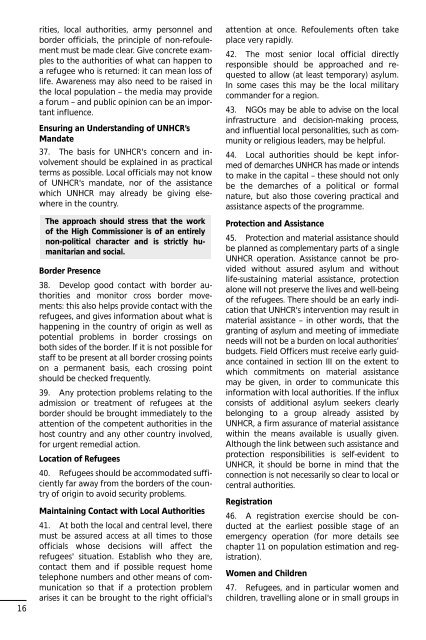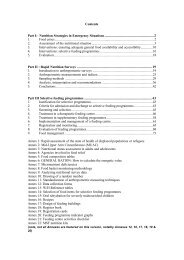UNHCR Handbook for Emergencies - UNHCR eCentre
UNHCR Handbook for Emergencies - UNHCR eCentre
UNHCR Handbook for Emergencies - UNHCR eCentre
You also want an ePaper? Increase the reach of your titles
YUMPU automatically turns print PDFs into web optimized ePapers that Google loves.
16<br />
rities, local authorities, army personnel and<br />
border officials, the principle of non-refoulement<br />
must be made clear. Give concrete examples<br />
to the authorities of what can happen to<br />
a refugee who is returned: it can mean loss of<br />
life. Awareness may also need to be raised in<br />
the local population – the media may provide<br />
a <strong>for</strong>um – and public opinion can be an important<br />
influence.<br />
Ensuring an Understanding of <strong>UNHCR</strong>’s<br />
Mandate<br />
37. The basis <strong>for</strong> <strong>UNHCR</strong>'s concern and involvement<br />
should be explained in as practical<br />
terms as possible. Local officials may not know<br />
of <strong>UNHCR</strong>'s mandate, nor of the assistance<br />
which <strong>UNHCR</strong> may already be giving elsewhere<br />
in the country.<br />
The approach should stress that the work<br />
of the High Commissioner is of an entirely<br />
non-political character and is strictly humanitarian<br />
and social.<br />
Border Presence<br />
38. Develop good contact with border authorities<br />
and monitor cross border movements:<br />
this also helps provide contact with the<br />
refugees, and gives in<strong>for</strong>mation about what is<br />
happening in the country of origin as well as<br />
potential problems in border crossings on<br />
both sides of the border. If it is not possible <strong>for</strong><br />
staff to be present at all border crossing points<br />
on a permanent basis, each crossing point<br />
should be checked frequently.<br />
39. Any protection problems relating to the<br />
admission or treatment of refugees at the<br />
border should be brought immediately to the<br />
attention of the competent authorities in the<br />
host country and any other country involved,<br />
<strong>for</strong> urgent remedial action.<br />
Location of Refugees<br />
40. Refugees should be accommodated sufficiently<br />
far away from the borders of the country<br />
of origin to avoid security problems.<br />
Maintaining Contact with Local Authorities<br />
41. At both the local and central level, there<br />
must be assured access at all times to those<br />
officials whose decisions will affect the<br />
refugees' situation. Establish who they are,<br />
contact them and if possible request home<br />
telephone numbers and other means of communication<br />
so that if a protection problem<br />
arises it can be brought to the right official's<br />
attention at once. Refoulements often take<br />
place very rapidly.<br />
42. The most senior local official directly<br />
responsible should be approached and requested<br />
to allow (at least temporary) asylum.<br />
In some cases this may be the local military<br />
commander <strong>for</strong> a region.<br />
43. NGOs may be able to advise on the local<br />
infrastructure and decision-making process,<br />
and influential local personalities, such as community<br />
or religious leaders, may be helpful.<br />
44. Local authorities should be kept in<strong>for</strong>med<br />
of demarches <strong>UNHCR</strong> has made or intends<br />
to make in the capital – these should not only<br />
be the demarches of a political or <strong>for</strong>mal<br />
nature, but also those covering practical and<br />
assistance aspects of the programme.<br />
Protection and Assistance<br />
45. Protection and material assistance should<br />
be planned as complementary parts of a single<br />
<strong>UNHCR</strong> operation. Assistance cannot be provided<br />
without assured asylum and without<br />
life-sustaining material assistance, protection<br />
alone will not preserve the lives and well-being<br />
of the refugees. There should be an early indication<br />
that <strong>UNHCR</strong>'s intervention may result in<br />
material assistance – in other words, that the<br />
granting of asylum and meeting of immediate<br />
needs will not be a burden on local authorities’<br />
budgets. Field Officers must receive early guidance<br />
contained in section III on the extent to<br />
which commitments on material assistance<br />
may be given, in order to communicate this<br />
in<strong>for</strong>mation with local authorities. If the influx<br />
consists of additional asylum seekers clearly<br />
belonging to a group already assisted by<br />
<strong>UNHCR</strong>, a firm assurance of material assistance<br />
within the means available is usually given.<br />
Although the link between such assistance and<br />
protection responsibilities is self-evident to<br />
<strong>UNHCR</strong>, it should be borne in mind that the<br />
connection is not necessarily so clear to local or<br />
central authorities.<br />
Registration<br />
46. A registration exercise should be conducted<br />
at the earliest possible stage of an<br />
emergency operation (<strong>for</strong> more details see<br />
chapter 11 on population estimation and registration).<br />
Women and Children<br />
47. Refugees, and in particular women and<br />
children, travelling alone or in small groups in



